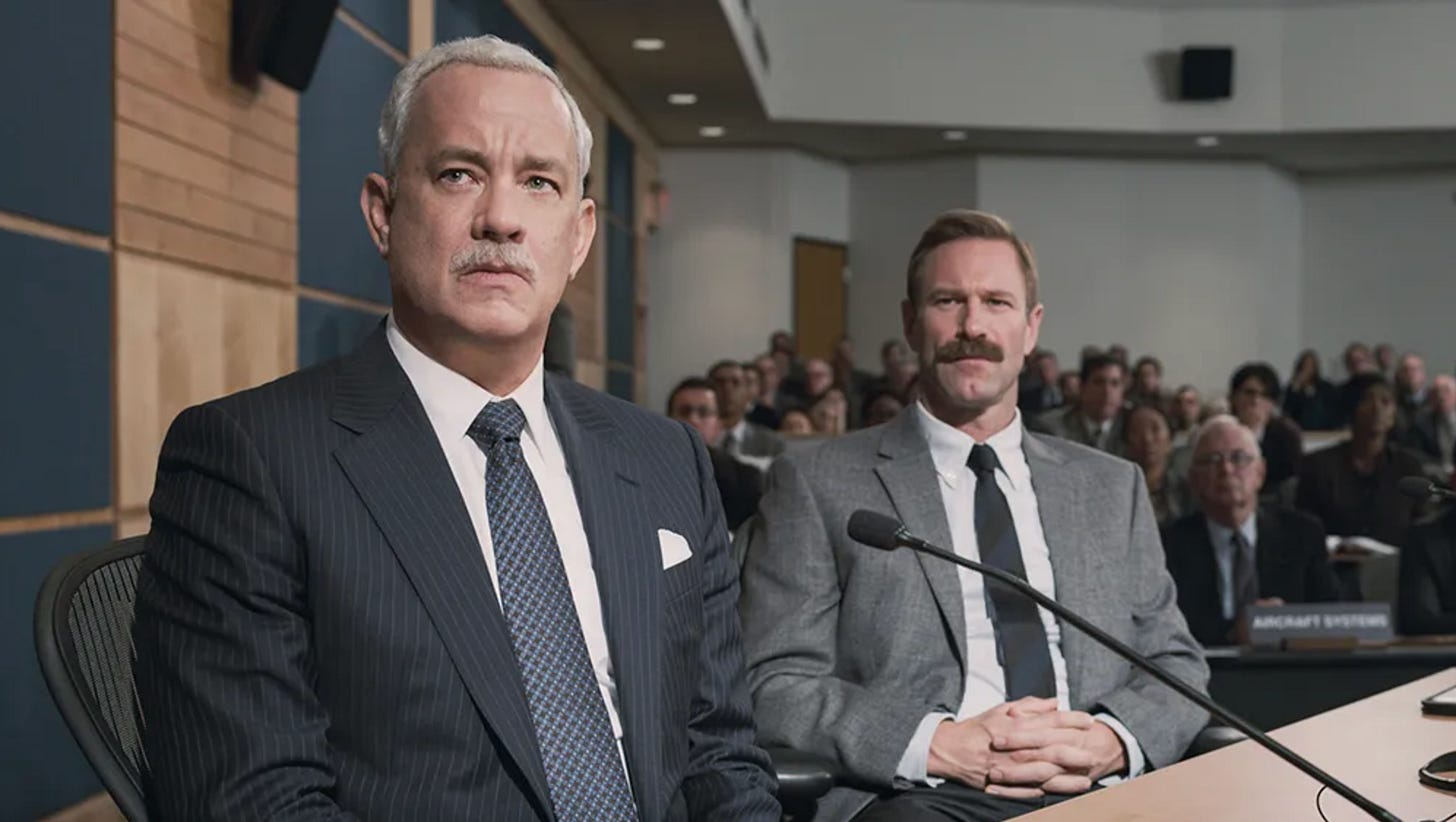Sully
Prequel to a Rehearsal
Having finished the second season of Nathan Fielder’s remarkable The Rehearsal, it only seemed natural to circle back to Sully (2016). Given the context of Fielder’s ridiculous, outstanding commentary on the state of commercial aviation, and Fielder’s own turn playing Captain Sully, I was excited to find out who wore it better. There’s a quiet dignity to the non-Fielder Sully (2016), which is either Clint Eastwood’s most restrained film or just the one least interested in explaining itself. It’s a tight, 96-minute procedural about Captain Chesley “Sully” Sullenberger (Tom Hanks), the veteran pilot who, in 2009, landed a failing commercial jet on the Hudson River, saving all 155 people on board. The moment is mythic in the American imagination, and it’s also the film’s flashiest beat. Even then, it’s delivered with minimal Hollywood flair. Eastwood is more interested in what happens after the miracle, when bureaucracy kicks in and doubt starts to seep into Sully’s life.
The film is most compelling in its structure, looping back to the crash from different angles: replaying the event as Sully second-guesses himself under the harsh light of an NTSB investigation. Hanks, never better, plays the man like a weathered monument that’s starting to form cracks. His Sully doesn’t grandstand, doesn’t fall apart, doesn’t rise triumphantly. He just endures. He’s tired. He has a mustache. He goes for jogs in grey sweats. Per usual, Hanks brings goodness and levity to an everyman with aplomb. It is unclear if he prepared for this part using the Fielder method.
But let’s not oversell it. Sully sometimes feels like a short story padded into a novella. There’s a subplot with his wife (Laura Linney) that barely flickers to life and consists mainly of phone calls that go nowhere. The film flirts with being an indictment of technocratic overreach: “human error” versus computer simulations, but never quite delivers the emotional or political punch it seems to be setting up. The supporting characters are more symbolic than dimensional. Even the crash, rendered in digital effects, feels a little... soft around the edges. In Fielder’s Rehearsal, a simulated plane crash with actors reading the scripts from the recorded final words of pilots feels more harrowing because of its obvious forensic purpose. In Sully, the numbing effect of modern Hollywood filmmaking style becomes glaringly apparent.
And yet, Sully gets at something rare in modern American cinema: the idea that heroism can look like staying calm, doing your job, and not needing applause after. In that sense, it’s a mirror of its main character. Stoic, efficient, and just self-aware enough to question the myth it’s burnishing. When Sully says, “I’ve delivered a million passengers over 40 years and in the end, I’m going to be judged on 208 seconds,” it’s a quiet lament. Eastwood delivers the line with restraint. It lands.
Somewhere in the folds of this small, precise film is a big idea: that doubt is what makes integrity possible. In this, it seems Sully and The Rehearsal can agree.
Sully
Written by Todd Komarnicki; Directed by Clint Eastwood
2016
96 minutes
English
Recommended way to watch (at time of publication): Currently streaming on HBO Max alongside season 2 of The Rehearsal
You’ll like this if you like: Apollo 13 (1995), Flight (2012), Tom Hanks

